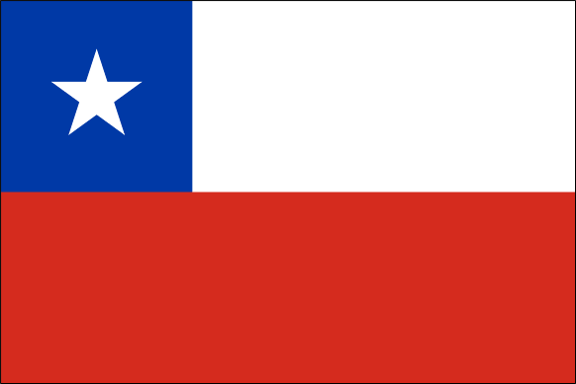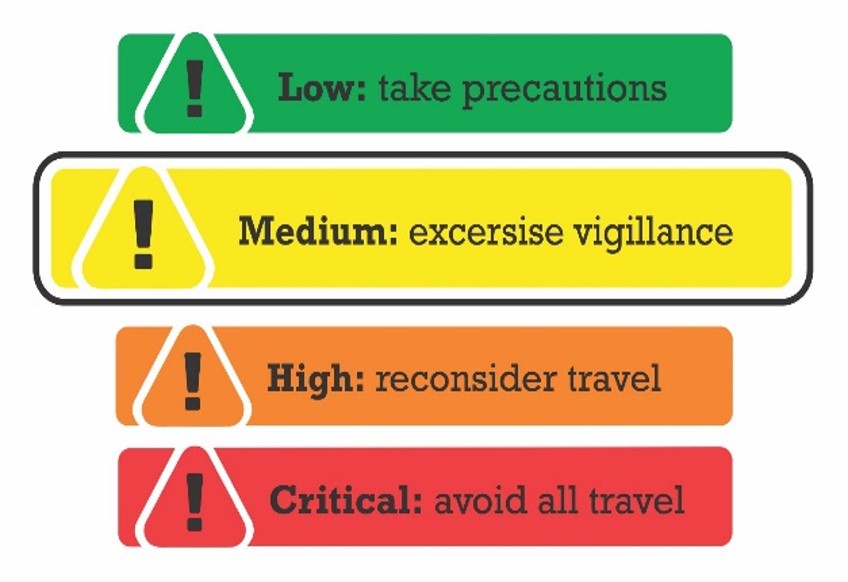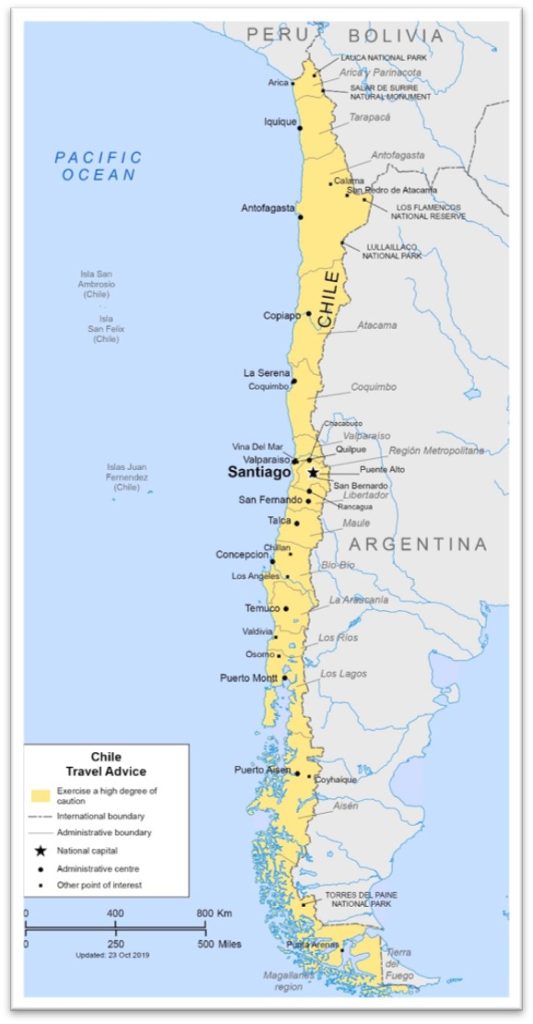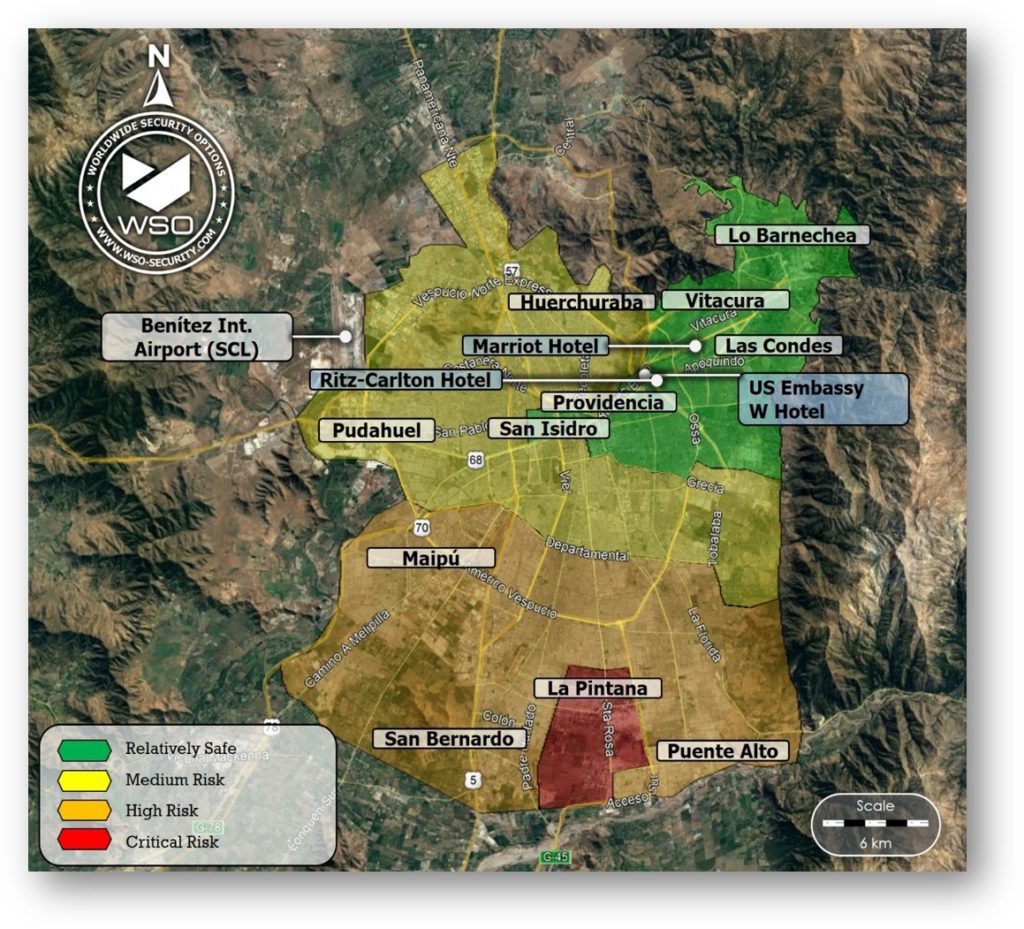| Official Name: | Republic of Chile |
| Official Language: | Spanish |
| Area: | 756 102,4 km2 (291,930.4 sq mi) |
| Population: | 18,186,770 |
| Time Zone: | UTC−4 (winter) / UTC-3 (summer) UTC-3 (Magallanes and Antarctica) |
| Capital City: | Santiago |
| Height (Santiago): | 570 m (1,870 ft) |
| Currency: | Peso (CLP) |
| Main Cities: | Santiago, Concepción, Valparaíso |
| Main Port: | San Antonio |
| Required visa for entry: | Nationals from Canada, EU countries, and the UK and others DO NOT require visas. Australian citizens must pay 117 USD upon entry. Click here for more information concerning visa requirements. |
| Required vaccination for entry: | None |

Main Risks:
Theft, robbery, rape, drug trafficking, fraud, carjacking.
Executive Summary
Chile features medium risks. Low-level crime is the main threat to locals and foreigners, who are liable to suffer theft or become victims of fraud. We recommend exercising vigilance and situational awareness as basic precautions to mitigate the risk posed by crime. Risk levels increase considerably in Santiago’s southern neighborhoods (locally known as “comunas”) and could likewise increase in rural areas in the Patagonian provinces of Chile, where indigenous militant elements operate. Visits to Santiago or to the cities along the Pacific coast do not require executive protection services. However, we do recommend to procure secure transportation services for business or high-profile trips.

General Risk Level: MEDIUM.
The risk remains stable throughout the country. It is necessary to take or anticipate increased security precautions before traveling to rural zones or neighborhoods flagged as dangerous.

Crime and Security
Low-level crime is the main threat to those visiting Chile. The risk of suffering acts of violence is higher in Chile’s peripheric southern neighborhoods (“colonias”). There is a risk of Mapuche-indigenous militancy in rural areas in Chile’s Patagonia, especially in the Araucanía region.
Although the main areas in Santiago and the cities along the Pacific coast are safe, no region or locale is completely spared from criminal activity.
Political rallies and unruly demonstrations in Chile have surged since the beginning of an ongoing political crisis in October 2019. In view of heightened political sensitivities and social polarization, demonstrations are often infiltrated by violent activists who commit acts of vandalism against public and private property. Protests are generally monitored by security forces, who are liable to resort to water cannons and tear gas to evict demonstrators. Political risk levels in Chile have traditionally been minimum. That said, political developments in 2020 could potentially undermine stability, especially in light of possible setbacks in the constitutional reform process backed by the opposition.
Security in Santiago
In General, the safest areas are located in the northeast of the city. Neighborhoods (organized as “comunas”) recommended for lodging, travel, and conducting business and transactions are San Isidro, Lo Barnechea, Vitacuara, Providencia y Las Condes. The last two represent the Central Business District (CBD) of the city, colloquially known as “Sanhattan”. These areas are perceptibly safer because they feature prominent hotels and embassies. Moreover, these areas envelop Santiago’s medium and high classes. That said, even in these areas it is still necessary to take basic precautions to mitigate the risk posed by crime. Note that carjacking and armed assault are liable to occur. These threats chiefly affect locals. The Arturo Merino Benítez International Airport (SCL) is located west of Santiago. The trip between the airport and the CBD in Las Condes should take approximately between 20 and 35 minutes depending on traffic.

Transportation
For security reasons, we advise against using urban public transportation except for Santiago’s metro. However, taking into account the risk posed by crime and the precedent of vandalism against the metro network, it is still preferable to use ride-sharing apps. It is also feasible to use private taxis recommended by reputable hotels. Please note that taxi drivers may take advantage of foreigners to prolong the duration of trips and inflate fares. If possible, for convenience and security alike, for business or high-profile itineraries we recommend procuring private secure transportation services before traveling to the country. For travel within Chile take domestic flights or use federal highways. These are in good condition and are deemed safe.
Health and Sanitary Conditions
There are no specific conditions in Chile that could present health risks to travelers visiting the country. The quality of tap water is very good and all areas are well supplied.
As a precaution, it is not advised to travel without international health insurance covering emergency medical evacuation to the country of origin.
Take essential health precautions to mitigate the risk of contracting diseases or viruses. Carry masks in crowded places such as airports and maintain rules of social distance and avoid contact with surfaces of common use in public places. Always carry hand sanitizer.
Tactical Recommendations
Take basic precautions to mitigate the risk posed by low-level crime. While some neighborhoods (“colonias”) in Santiago are safer than others, all urban areas remain vulnerable to criminal episodes. Exercise vigilance during trips to southern parts of the country, especially in the Araucanía region, due to the localized risk posed by indigenous militant elements.
In Santiago refrain from venturing beyond the safest neighborhoods, generally located in the center and northeastern parts of the city.
If the trip involves business or high-profile itineraries, we recommend procuring private transportation services.
Avoid carrying large sums of cash or valuables during the trip. We advise against wearing or carrying items in public that may give the impression of economic affluence and which could attract unwanted attention from criminals.
Do not resist armed robbery attempts. We recommend to always carry a few twenty thousand pesos bills (CLP) or a few fifty USD bills for duress cases, specifically to appease criminals looking for easy money.
To reduce the risk of being scammed, we recommend changing money only in reputable exchange businesses. If possible, procure international medical insurance covering emergency evacuation to the country of origin.
Emergency Contacts
Police: 133
Ambulance: 131
Fire: 132
WSO Global Command Center: +1 956 467 4858 / gcc@wso-security.com
Security advice and assistance over WhatsApp: +593 99 461 1128 / +521 81 1511 3166







